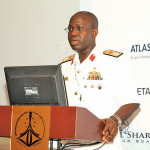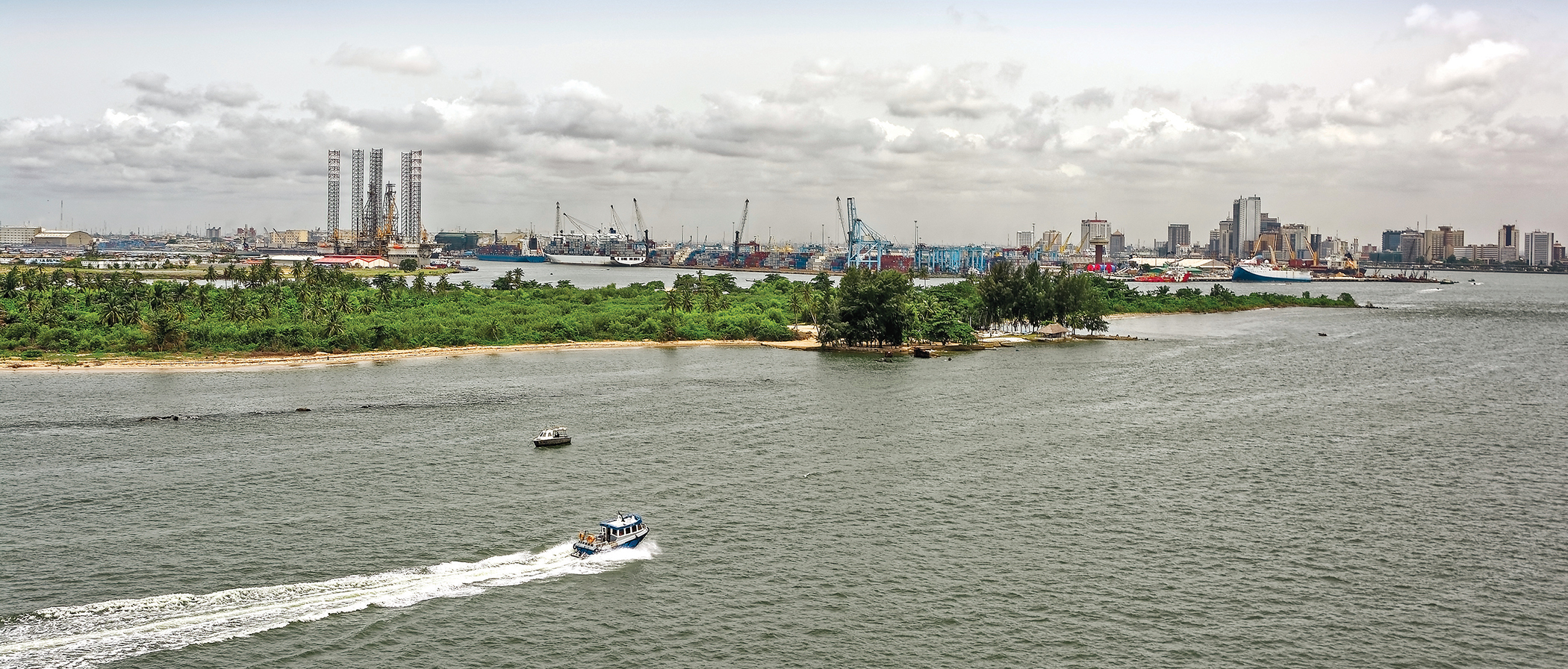A Nigerian Admiral outlines the key steps needed to stop piracy
REAR ADM. ADENIYI ADEJIMI OSINOWO

Rear Adm. Adeniyi Adejimi Osinowo has served in the Nigerian Navy for more than 30 years. During that time he has held the positions of chief of training and operations, and director of transformation for the Navy. He was also on the directing staff of the National Defence College in Abuja. In 2011, he received the Meritorious Service Medal from the United States for his seven months spent as deputy commander of Africa Partnership Station. He also helped develop the Africa Integrated Maritime Strategy 2050, outlining the continent’s strategy to secure its maritime domain. This article was adapted from a security brief written for the Africa Center for Strategic Studies.
Combating piracy and armed attacks on shipping in the Gulf of Guinea requires work across the piracy cycle. This includes addressing shore-based causes, offshore transit vulnerabilities and the markets for piracy proceeds. Stemming the tide of attacks equally demands more deliberate cross-cutting efforts that incorporate preventive, deterrent, and collaborative measures among national and regional stakeholders. Here are some areas where West African security professionals can focus their efforts to maximize results.
Maritime space management: Improving security is more about the strategic management of maritime space than it is about naval fleets and patrol craft. Central and West African states must define clearer transit corridors and anchorage sites to protect merchant vessels in their territorial waters and exclusive economic zones, which extend 200 nautical miles (nmi) from a country’s coast. This would be akin to the Internationally Recommended Transit Corridor that has functioned well in the Gulf of Aden and has been replicated as a Voluntary Reporting Area in the Gulf of Guinea. Such arrangements require a combination of regional and national collaboration that could be facilitated by the Maritime Inter-Regional Coordination Center (MICC) in Yaoundé, Cameroon.
Viewing the success of the Secured Anchorage Area in Lagos Harbor, a public-private security partnership offering around-the-clock protection to vessels wishing to anchor safely near the Lagos port channel, similar concepts should be established around approaches to all ports in the region, including enforcement and sanction processes for vessel violations. Such procedures will improve vessel safety and simplify the patrol and surveillance demands on maritime authorities.
To advance regional maritime space management, there is a need to fast track the activation of the MICC and the multinational maritime coordination centers, including Maritime Zone E, which is composed of Benin, Niger, Nigeria and Togo (see map, page 13). This will facilitate information sharing among law enforcement agencies, maritime commerce stakeholders and international partners. In particular, the establishment of national maritime operation centers could resolve some difficulties in interagency cooperation among navies and port- and flag state-control authorities.
Enforcement harmonization: The limited number of piracy-related trials underscores the need for greater harmonization of legal efforts in the region as stated in the memorandum of understanding among the Economic Community of Central African States (ECCAS), the Economic Community of West African States (ECOWAS) and the Gulf of Guinea Commission. To do so, a thorough review of each country’s legal framework should be undertaken to enable each to effectively prosecute pirates. Efforts to fast track extraditions and to synchronize penalties for crimes at sea across jurisdictions would prevent pirates from finding more lenient treatment across coastal boundaries.
Members of the judicial system should be trained in coordination with maritime enforcement agencies to speed up and standardize evidence collection and preservation to facilitate efficient and fair trials. Creating courts dedicated to prosecuting piracy and sea robbery may help minimize these delays.
Internavy cooperation: Authorization of a standing forum for regional heads of navies by the ECOWAS Committee of Chiefs of Defence Staff could provide much-needed synergy for coordination. This has been done in Maritime Zone E and needs to be replicated among other zones under ECOWAS. The Political Affairs, Peace and Security Department of ECOWAS has the responsibility in this regard to encourage the activation of zonal coordination for all member states, including common understandings and prosecutions of cross-border and extraterritorial crimes.
Asset Requirements: A layered deterrent mechanism characterized by maritime air patrols, patrols by offshore patrol vessels (OPVs) and seaward defense boats (SDBs), and terrestrial- and satellite-based surveillance assets will be needed to monitor and secure the Gulf of Guinea. A theoretical 100-nmi radar coverage and patrol radius should be assumed for each patrol vessel.
For every vessel at sea, one should be on standby while another undergoes routine maintenance. Based on these assumptions and West Africa’s approximately 3,000-nmi coast, the aggregated minimum OPV requirement for effective deterrence and response amounts to 90 craft. Compared to the current inventory of 32 OPVs/equivalent assets (frigates, corvettes and large patrol craft), governments should consider the 58-OPV deficit as a working guide on future capitalization efforts. In the relatively calm and open waters of the region, OPVs of under 1,000-ton displacement with minimal weaponry would suffice. SDB requirements would enable effective presence in the approaches to all regional ports with a similar provision that two additional SDBs be available for each one deployed. States with long coastlines or piracy hot spots should consider acquisition of fixed- and rotary-wing maritime patrol aircraft. These projections, though ambitious, provide a planning guide for governments, navies, foreign partners and investors.
Profiling piracy networks: Breaking the cyclical chain of attacks on shipping in a cost-effective manner requires a robust capacity for profiling maritime crime and sharing information among stakeholders in the region. Such a capacity would involve monitoring transiting vessels, their crews, and their ownership with a view to profiling suspicious vessels and individuals, including monitoring in coastal communities. A watch list for suspect vessels and human accomplices should be developed, updated and shared.
An international campaign to close off markets and financial centers to stolen oil and its proceeds would raise the cost of stealing from the Gulf of Guinea. This would require more concerted efforts among Central and West African states and their global partners to identify and sanction criminal networks involved in the laundering of proceeds from piracy and related crimes. Sanctioning vessel owners and organizations known to be the beneficiaries of proceeds from attacks and oil theft would be extremely useful, and yet is a significant gap in the collaboration among the European Union, Asian and African states.
Partnership Engagement: More collaboration is needed among international partners and African governments in the international waters around the Gulf of Guinea. Operations Atalanta, Ocean Shield, and Combined Task Force 150/151 in the Gulf of Aden and Indian Ocean provide an adaptable template. There would also be value in U.S., European and Asian partners strengthening naval and coast guard capacity in the region through effective collaboration.
Targeted economic development on the coast: The situation in the Niger Delta and widespread poverty in the region underscore the need for more concerted infrastructural development, youth employment and coastal environmental protections. Given that the waters off the Niger Delta account for more than half the piracy attacks recorded in recent years, there is a need to improve economic opportunities for coastal communities there. Likewise, given the socio-economic impacts of illegal fishing, pollution and environmental degradation, state and local governments across the region must focus on maritime-related policy matters that directly impact coastal residents. This includes enforcing laws governing foreign companies’ intrastate shipping, proper application of environmental laws, and expanding shipbuilding, fishing, and other industries where significant production deficiencies still exist. Such advancements would reduce the incentives that drive youth into piracy and create shared interests among communities, the state and the private sector in a secure and vibrant maritime economy.
CONCLUSION
As countries in the Gulf of Guinea increasingly rely on the seas for economic prosperity, the evolving violent attacks on shipping with transnational dimensions call for multilateral remedies. Some of these, including Maritime Zone E and the MICC, already are underway. Governments also must uproot the drivers of piracy as well as expand the resources and shared interests in a secure maritime domain. None of these recommendations will gain enough traction to be self-sustaining until the discussion of maritime security in the Gulf of Guinea is raised from the operational to the ministerial level, where the purse strings are held. Until there is political will in each Central and West African country to protect the region’s waters, the Gulf of Guinea will remain a challenging security environment.


Comments are closed.